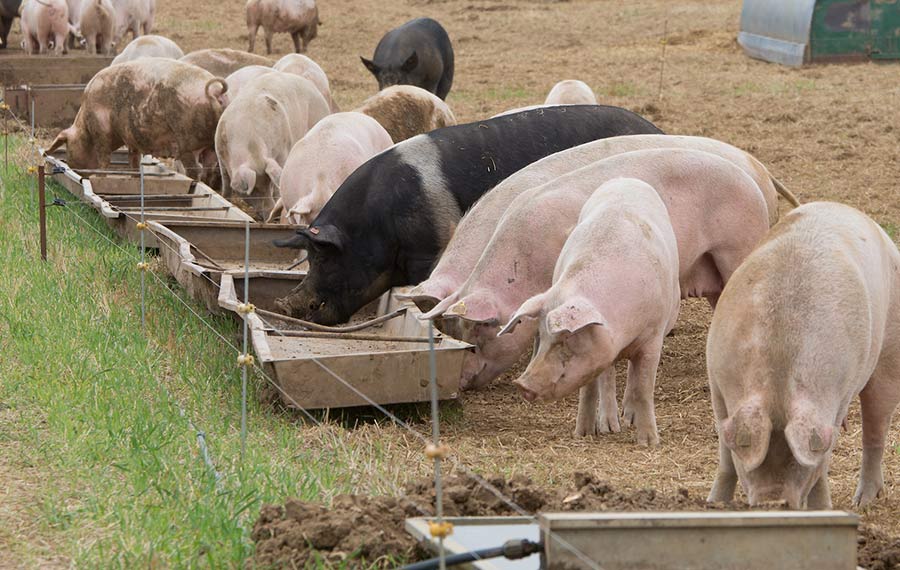Replace imported soya to cut carbon on pig farms, study says
 © Tim Scrivener
© Tim Scrivener Replacing imported soya with protein derived from home-grown crops for livestock feeds has the biggest potential to reduce the carbon footprint of UK pig farms, a new study has found.
Researchers from the Institute for Global Food Security (IGFS) at Queen’s University, Belfast, studied data on the carbon footprint of pig farms in England, Scotland and Wales over the past 20 years.
They used historic AHDB data to calculate that carbon emissions of British pig farming have reduced by almost 40% over this period.
See also: Analysis: Could lupins solve the break crop challenge?
The role of animal feed was found to be central to the environmental impact of pig farms – accounting for between 75-80% of carbon footprint.
However, changes to feed ingredients have the potential to significantly alter the carbon rating of pig farms and the industry as a whole, say researchers.
Alternative protein crops
Soya imported from South America has a high environmental footprint associated with deforestation.
The increasing trend of replacing this imported soya with home-grown crops, such as rapeseed and sunflower meal, to feed pigs was found to have a significant mitigating effect on environmental outputs.
Advances in animal nutrition and feedstuff availability were also found to have had a beneficial effect, particularly the increased availability of synthetic amino acids and enzymes – the price of which decreased over the time period in question.
When added to domestic feedstuffs like rapeseed, supplementary ingredients increased nutrient availability and improved feed balance.
It was found to have reduced nutrient excretion in manure while boosting animal productivity by as much as 30%.
The study also found that adding supplements in animal feed helped lower levels of phosphorous in run-off from pig manure by more than 20%, reducing the contribution of pig systems to freshwater pollution.
Funded by the EU, the research was led by Ilias Kyriazakis from IGFS, in collaboration with other UK institutions, using publicly available AHDB data from Great Britain from 2000-2020. It has been published in the Agricultural Systems journal following peer review.
Prof Kyriazakis said: “I believe there are important lessons to be learned from this study – not only for better environmental management as it relates to pig farming, but potentially for all livestock systems.
“Some of the improvements identified in this study could potentially be applied to other animal systems, which would ultimately help move our collective agriculture systems towards a carbon-neutral model.”
Net-zero ambition
The UK government has set a target for British agriculture to reach net-zero greenhouse gas emissions for agriculture by 2050. The NFU has set the industry an ambitious target of reaching this goal by 2040.
Northern Ireland’s government has outlined plans to pay arable farmers £330/ha to produce home-grown protein crops to reduce the country’s reliance on imported soya.
Defra may also fund farmers in England to grow protein crops under its forthcoming Environmental Land Management (ELM) scheme. It has already said it could provide support for farmers to work with animal feed producers to trial new feed additives under ELM.
According to the Agricultural Industries Confederation (AIC), more than 1m tonnes of imported soya was used by UK livestock farms to produce chicken, dairy and other foods in 2019.
